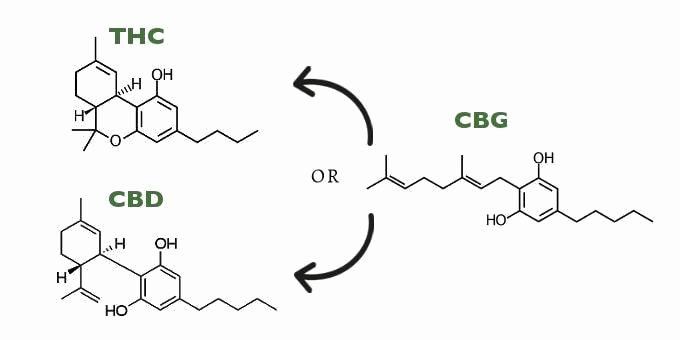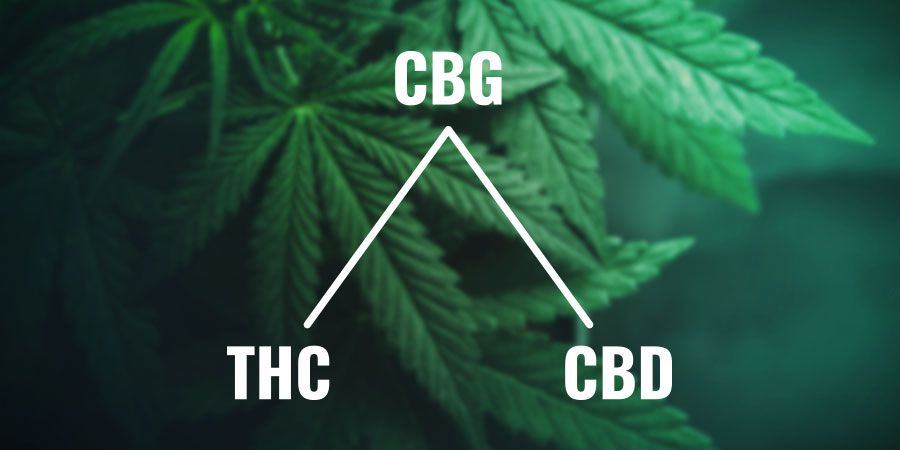By now most people familiar with cannabis will be aware that the plant contains more than 100 cannabinoids, the most common to date being CBD (cannabidiol) and THC (tetrahydrocannabinol).
There has been a decent amount of research on CBD and THC, but not so much on CBG. That said, with CBG becoming more popular, there will likely be more studies on it soon.
This lesser known cannabinoid called cannabigerol (CBG), while not present in large quantities in most cannabis strains (less than 1%); it is worth investigating, for a number of reasons…
CBG is often referred to as “the mother of cannabinoids” and plays an important role in how cannabinoid celebrities CBD and THC are formed. While often overlooked, possibly due to its scarcity in the plant itself, CBG is gaining a lot of traction lately as more and more companies are starting to focus on its production.
An advantage CBG has over CBD is the way it interacts with the endocannabinoid system. While CBD’s ability to directly interact with the brain’s cannabinoid receptors is limited, CBG binds directly to the CB1 and CB2 receptors and provides more direct effects to the system.

CBG’s Potential Medical Benefits…
CBG has been found to act on very specific physiological systems and problems; and results for medicinal use are promising:
· Endocannabinoid receptors are prevalent in eye structures and interestingly, CBG is thought to be particularly effective in treating glaucoma because it reduces intraocular pressure. It is a powerful vasodilator and also has neuroprotective effects.
· In animal experiments CBG was found to be effective in decreasing the inflammation characteristic of inflammatory bowel disease in mice.
· In a recent experiment CBG was shown to protect neurons in mice with Huntington’s disease, which is characterised by nerve cell degeneration in the brain.
· CBG is also showing great promise as a potential cancer fighter. Specifically, CBG was shown to block receptors that cause cancer cell growth. In one study, it was shown to inhibit the growth of colorectal cancer cells, thereby slowing colon cancer growth. CBG inhibited tumors, therefore demonstrating a very exciting possibility for colorectal cancer.
· Overseas research shows evidence that CBG is an effective antibacterial agent, particularly against Staphylococcus aureus (MRSA) microbial strains resistant to several classes of drugs. In fact, since the 1950s, topical formulations of cannabis have been effective in skin infections, but researchers at the time were unaware of the plant’s chemical composition. (MRSA is commonly found in hospitals, prisons, and nursing homes; where people with open wounds; invasive devices such as catheters; and weakened immune systems are at a greater risk of infection. MRSA can take hold in human tissues and eventually become resistant to antibiotics and penicillan treatment).
· In 2017 a study showed that a form of CBG (purified to remove the THC component) was a very effective appetite stimulant.
· Testing is also underway, looking at the effects of different cannabinoids on bladder contractions, CBG tested best at inhibiting muscle contractions, so it may be a future tool in preventing bladder dysfunction disorders.
Scientists are excited about these initial CBG results and are promoting future research with CBG alone or CBG in combination with other cannabinoids and therapies for the treatment of multiple ailments. Because it is non-psychotropic, CBG has a promising wide range of potential applications, not only for the problems mentioned above, but also as an analgesic, therapy for psoriasis, and as an anti depressant.
Does CBG Cause any Side Effects?
While the research conducted on CBG is still in its infancy, what we do know about CBG is very promising…
We know it shows promise as an antibacterial agent and is an anti-inflammatory, but very little is known about the side effects of CBG oil or other forms of CBG. So far, it seems to be well tolerated by rats in laboratory studies, but there’s not enough research to say much about the potential side effects it might have on humans.
The potential health benefits of CBG are extensive. A non-intoxicating compound, it’s thought to help regulate mood, thanks to its ability to boost anandamide, the body’s native “feel good” molecule.
CBG “The Rolls Royce of Cannabinoids”…
Despite the medical appeal and consumer demand there’s one big hurdle to face…
CBG is expensive to produce, so much so, it’s been dubbed “the Rolls Royce of cannabinoids”. It takes thousands of kilos of biomass to create small amounts of isolated CBG, because most hemp plants only contain 1% of CBG compared to some hemp strains that contain 20% CBD in the crop. If the CBG content of the same crop is only 1%, that means you need to extract 20 times the amount of biomass to get the same amount of CBG out. Remember, CBG converts to CBD or THC if you wait until it’s time to harvest the plant. Do you sacrifice an entire crop to process and produce pure CBG?
The current genetics of cannabis plants have been bred to produce as much CBD and/or THC as possible thanks to consumer demand. There’s a good chance CBG will follow the same trajectory as CBD products. Through development of innovative hemp genetics CBG is becoming more widely available.
Genetics is one factor in CBG’s production costs. Another is – surprisingly – a surge in consumer demand. Hemp growers are now experimenting in the development of plants with a higher CBG genetic yield. By developing better CBG genetics whereby the CBG is the dominant cannabinoid expressed within the plant, production costs can be lowered, with a flow on effect to consumers.
At iCannabis we are committed to establishing an Australian medical cannabis community comprised of passionate and caring people, focused on the highest quality organic medicine made with love and integrity.
If you need any advice or help with CBG or sourcing full spectrum cannabis oil treatments please contact us.

